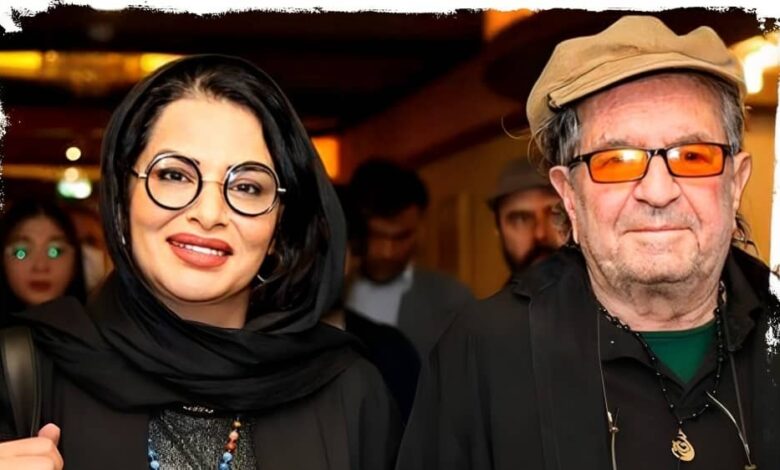Iran’s 1990s Chain Murders Pattern Resurfaces in the Tragic Death of Filmmaker Dariush Mehrjui

dariush mehrjui + Vahideh Mohammadi Far (1)
Written by
Mehdi Oghbai
On Saturday, October 14, Dariush Mehrjui, a renowned Iranian film director, and his wife, Vahideh Mohammadi-Far, were tragically murdered in their home in Karaj under suspicious circumstances. The Iranian state media attributed this heinous crime to unidentified perpetrators, though Iran’s society, which still has a fresh memory of the chain murder series of the 1990s knows perfectly well where to lay the blame.
According to the latest updates, the regime claims to have apprehended four suspects linked to the murder of Dariush Mehrjui and his wife.
According to police authorities, Mona Mehrjui found her father and his wife lifeless in their home in Zibadasht, Karaj, on Sunday evening. She had visited her father and upon making this discovery, she promptly notified the police.
On Sunday, October 15, the state-run Etemad newspaper published an interview with Mehrjui’s wife who reported that they had been threatened by someone on October 7. According to the source, Vahideh Mohammadi-Far said, “I became aware of our dog’s barking in the yard. I quickly locked the kitchen entrance. Until I realized that someone with a knife was clinging to the frosted windows of the entrance.”
Dariush Mehrjui’s wife did also mention, “I said loudly, ‘I’ll now call the police.’ In response to my words, he said, ‘Well, go ahead, call.’ When he replied like that, I realized he didn’t have an Iranian accent.”
In another news report, Fars News Agency, citing an “informed source,” provided details about the murder of Dariush Mehrjui, stating that “Mehrjui was fatally struck with three blows to the throat, and his wife lost her life with a blow to the temple.”
As per the information from this news agency, which is associated with the Islamic Revolutionary Guard Corps, “there were no signs of resistance on Mehrjui’s wife’s body, and two mobile phones were stolen.”
#Iran News in Brief
Following a petition signed by dozens of #Iranian filmmakers& actors that asked the armed forces to avoid cracking down on protesters, a former MOIS interrogator accused them of perusing regime change and called for their punishment.https://t.co/UC49CMzRZK pic.twitter.com/TuSW3vyFzv
— NCRI-FAC (@iran_policy) June 15, 2022
The chain murders in Iran refer to a series of politically motivated killings that took place in the late 1990s. During this period, a number of dissidents, intellectuals, and writers critical of the Iranian regime were brutally murdered. The victims were often found stabbed or strangled, and the murders bore a distinct pattern, hence the term “chain murders.”
These killings were attributed to a group of agents within the ruling establishment, primarily connected to the Ministry of Intelligence and Security (MOIS). The victims were often accused of opposing the regime or even advocating political reform.
The revelation that the killings were orchestrated from within the government, specifically by the then-Deputy Minister of Intelligence and Security, Saeed Emami, left the public in utter shock. The Ministry of Intelligence and Security (MOIS) attempted to distance itself, attributing the murders to “rogue agents.” It went so far as to implicate Saeed Emami. State media reported that his body was discovered with dangerously high levels of arsenic in his blood, according to forensic experts. In an effort to mitigate the fallout, the regime claimed it aimed to cleanse the ministry, resulting in the dismissal of approximately 1,000 MOIS agents.
However, since all threads within the intelligence and security apparatus are ultimately controlled by the highest officials affiliated with the Supreme Leader’s office, the move has essentially been a public relations facade. Persecution, apprehension, torture, and killing of dissidents have remained a systemic approach of the regime’s so-called “national security” agenda.
Who is Esmail Khatib, Iran’s Minister of Intelligence (MOIS)
The Ministry of Intelligence (MOIS) is now headed by a person who perfectly mirrors the entire establishment of terror and suppression.#Iran #ProsecuteRaisiNOW
https://t.co/nFNpSVDa8s— NCRI-FAC (@iran_policy) September 22, 2021
The stabbing of Dariush Mehrjui occurred 1.5 years after the Iranian director released a video, vehemently protesting the Minister of Guidance and Culture’s dismissive approach towards his demands. In a daring stance, he warned the regime that he would take a stand, undeterred by the potential consequences. Mehrjui made it clear that he was willing to do whatever was necessary to secure his rights. The recent events suggest that the regime responded in its characteristic manner.
Iran’s 1990s Chain Murders Pattern Resurfaces in the Tragic Death of Filmmaker Dariush Mehrjui

